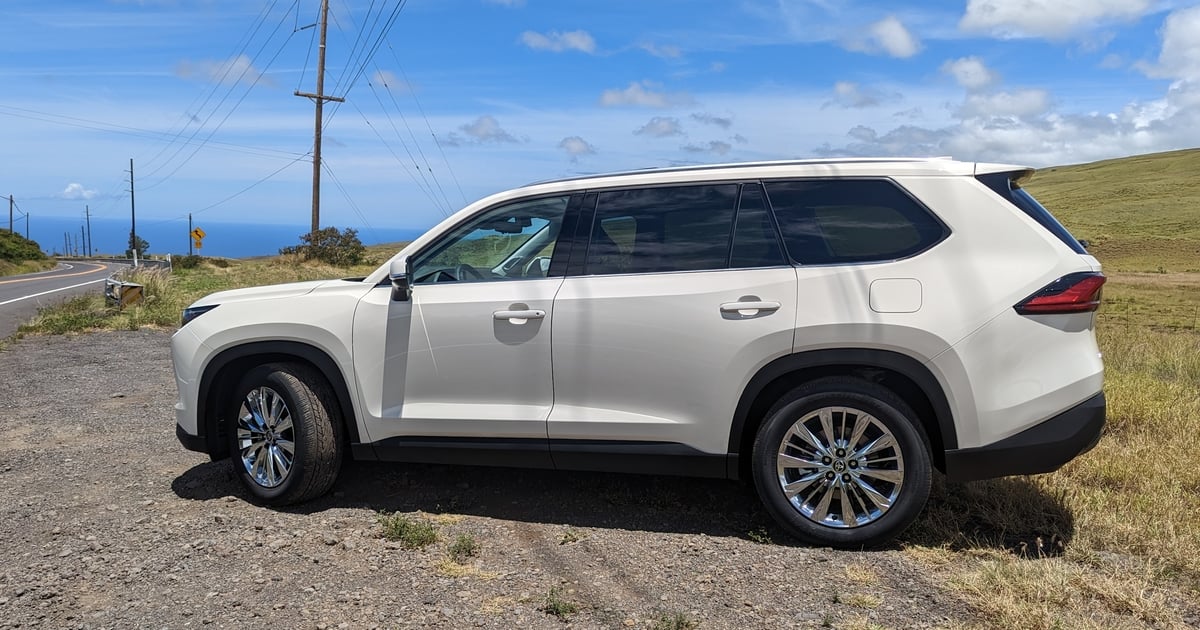
WAIMEA, Hawaii — Toyota North American brand head Dave Christ is fully prepared if the sales of his current top-selling three-row crossover, the Highlander, decline next year.
Any losses, Toyota’s group vice president said, will be more than made up by customers moving up to the larger 2024 Toyota Grand Highlander or coming back to the brand because it now has a comfortable non-minivan option for growing families.
“We do expect some cannibalization, people that may have bought a Highlander in the past,” Christ told Automotive News here during a media drive. “I’m a great example. I have three kids; the youngest one is just now getting out of a car seat, and my oldest is five-foot-five with shoes as big as mine. Putting him in the third row of a Highlander was a little tight.”
Arriving in dealerships this summer, the 2024 Grand Highlander is 2 inches wider, 2 inches taller and — most important — 6 inches longer than the current three-row Toyota Highlander, with the additional room aimed squarely at making the rear seating of the eight-person people-hauler more comfortable.
“We think the combined total [of Highlander and Grand Highlander] is going to be significantly more volume, because we get both ends: We get people that don’t need the third row as much, maybe a grandparent who drives their kid once a week and can get around fine in a Highlander, but then we have the Grand Highlander for people like me that have three kids and need the space,” Christ said.
In 2022, Toyota sold 222,805 Highlanders in the U.S., down 16 percent primarily on supply-related production restrictions. Through April, Highlander sales in the U.S. were down 13 percent to 74,697.
Toyota set its pricing and trim strategies on the Grand Highlander to let the larger three-row take advantage of the middle of the market.
While the Highlander has a base “L” trim level that starts at $37,995, including delivery, the Grand Highlander’s lowest trim level is the Highlander’s midgrade XLE package that starts at $44,405 — a $1,050 premium over the smaller Highlander at the same trim level. Both prices are for nonhybrid four-wheel-drive models, but the difference holds relatively steady across the trim walk, including for hybrid and all-wheel-drive models.
“The pricing decision was really to build it so that we didn’t have an enormous amount of overlap,” Christ explained.
Designed in the U.S. and manufactured in Toyota’s plant in Princeton, Ind., with the start of production set in June, the 2024 Grand Highlander comes equipped with a standard 2.4-liter turbocharged I-4 engine. Two optional hybrid powertrains featuring 2.5-liter I-4 engines are also available — one tuned for fuel economy and capable of delivering up to 36 mpg combined, or the Hybrid Max powertrain with added power, capable of delivering up to 362 hp and towing up to 5,000 pounds, delivering an estimated 27 mpg combined, Toyota said. All-wheel drive is optional on gasoline and hybrid models, and standard on Hybrid Max models.
In the cabin, seating for seven comes standard with second-row captain’s chairs, with the option for a second-row bench available to raise capacity to eight occupants in certain configurations. The Grand Highlander comes standard with a 12.3-inch touchscreen running the brand’s new Toyota Audio Multimedia system, which was developed in-house and works largely through voice prompts.
All Grand Highlander trims come standard with Toyota Safety Sense 3.0, a suite of upgraded safety and driver-assistance features including dynamic cruise control, lane keeping, automated headlights and a new system the brand calls Proactive Driving Assist. Toyota says that when certain “operating conditions are met, using the vehicle’s camera and radar, this system provides gentle braking into curves or gentle braking and/or steering to help support driving tasks such as distance control between a preceding vehicle, pedestrian or bicyclist.”